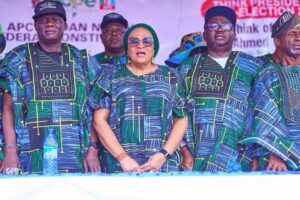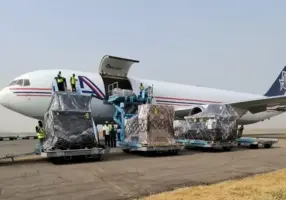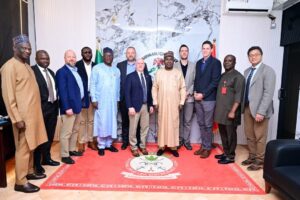The Federal Government has announced that the high-level African customs conference scheduled for Abuja next week will play a pivotal role in revitalising Nigeria’s economy, enhancing regional competitiveness, and opening fresh export pathways for small businesses under the African Continental Free Trade Area (AfCFTA).
Addressing journalists at the State House on Friday, the Comptroller-General of Customs, Adewale Adeniyi, said President Bola Ahmed Tinubu’s commitment to the summit underscores the administration’s determination to make trade a cornerstone of national development, industrial growth, and poverty reduction.
The gathering is expected to bring together representatives from over 30 African customs administrations, including 22 heads of agencies, alongside senior government officials, manufacturers, investors, airlines, shipping lines, port operators and logistics providers.
Discussions will centre on eliminating cross-border trade barriers and advancing continental economic integration.
Adeniyi explained that this year’s approach marks a significant shift, as the opening session will be driven by private-sector stakeholders. This, he said, will give businesses the opportunity to directly engage customs leaders and policymakers on the practical challenges of trading within Africa.
“Governments don’t trade; customs doesn’t trade. It is economic operators who move goods. Their voices must shape the reforms, whether on non-tariff barriers, procedural delays, port inefficiencies or uneven application of AfCFTA preferences,” he said.
Despite recording more than 30 percent growth in export volumes over the past two years, Adeniyi noted that Nigeria still sends most of its exports outside Africa.
Redirecting these flows to the continent’s $3.4 trillion market, he said, could stimulate new value chains, reduce logistics costs, ease currency transactions and create jobs.
He highlighted successful examples from the Authorized Economic Operator (AEO) programme, where Nigerian SMEs are already exporting leather products, handicrafts, processed foods and hibiscus flowers to Southern Africa—proof of the country’s competitiveness under AfCFTA.
READ ALSO: Customs, NAFDAC Strengthen Partnership to Safeguard Public Health, National Security
Adeniyi tied Nigeria’s increasing readiness for the agreement to broader government reforms, including customs modernisation, port decongestion, upgraded port infrastructure and work on a national single window system.
He added that Nigeria’s hosting of the next Intra-African Trade Fair and President Tinubu’s recognition as the Champion of Intra-African Trade in Services reinforce the country’s leadership role on the continent.
Read Also
Responding to concerns about tariff liberalisation, he argued that the long-term economic benefits will outweigh any short-term drop in customs revenue. “Yes, we collect revenue, but trade brings far greater prosperity. You cannot eat your cake and have it,” he said.
He outlined several key objectives for the Abuja conference: establishing a harmonised customs framework for AfCFTA implementation, resolving non-tariff barriers, creating a unified platform for customs, financiers and traders, strengthening links with Afreximbank and the AfCFTA Secretariat, and adopting clear, actionable reforms.
Adeniyi also revealed that AfCFTA implementation is a major performance indicator tied to his renewed mandate following President Tinubu’s extension of his service years.
He said effective implementation requires strong political will, technical capacity and a gradual reduction of customs duties on intra-African trade until they reach zero.
To drive this process, he noted the creation of the Concept of Partnerships for African Cooperation (CIPAC), which brings together institutions such as the Nigerian Export Promotion Council, NEXIM Bank, commercial banks and the Nigerian Ports Authority to support Customs’ coordination role.
While acknowledging the historical implementation challenges within African regional blocs, he emphasised that these issues are continental rather than unique to Nigeria. Duty-free access to goods produced within Africa, he added, will lower production costs, expand markets and encourage new investment.
Adeniyi also reported significant improvements in Customs’ performance, citing revenue growth of more than 70 percent in 2023 and 101 percent in 2024, with projections indicating even stronger results this year.
He stressed that Customs remains committed to revenue generation, national security and trade facilitation.
He described the Abuja conference as an important moment for Nigeria to reaffirm its place within Africa’s emerging trade architecture.
“This conference is about Nigeria signalling its readiness for Africa. With your support, Nigerians will better appreciate the enormous opportunities that AfCFTA holds for our economic renewal,” he said.
Adeniyi urged the media and the public to support the initiative, adding that broad collaboration is essential for Nigeria and the continent to fully unlock the benefits of open trade.





